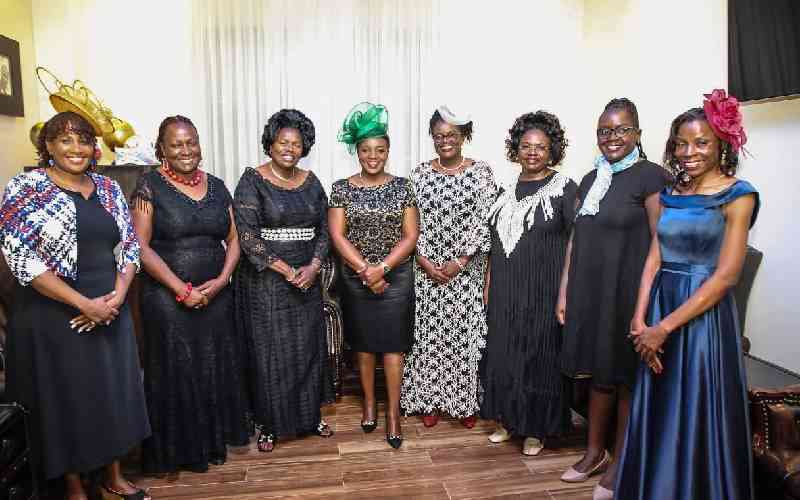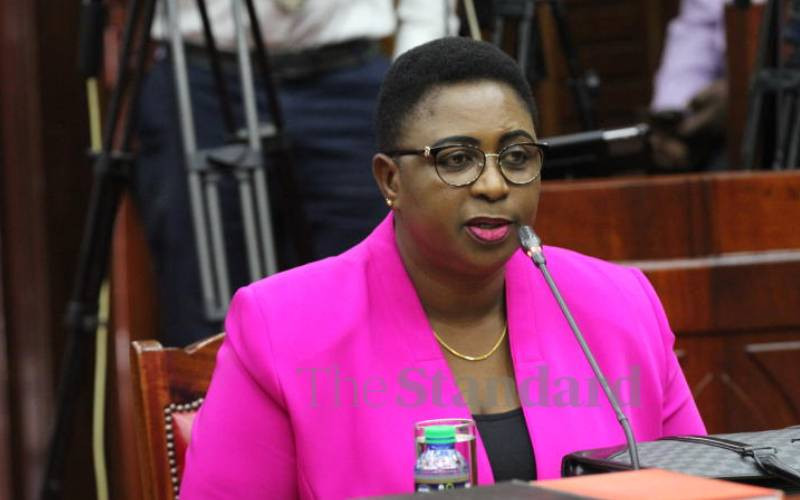Interior Cabinet Secretary Joseph Nkaissery says there is no high-ranking female police officer to replace Deputy Inspector General of Police Grace Kaindi, who exited the service early this week in a mini-reshuffle.
She was set to retire from the police service in 2018. How plausible is this in a society that professes gender parity?
This speaks a lot about women empowerment in Kenya even as it indicts women rights activists who do little to ensure women get deserved appointments and promotions in a male-dominated society and only wait to lambaste the Government when the few who made it under their own steam are seemingly 'victimised'.
Lately, women leaders have agitated about their male colleague's reluctance to actualise the two-thirds gender representation rule which, to them, is purely about political office. The journey to women empowerment traces a wide arc. It was great relief therefore that affirmative action was anchored in the 2010 Constitution. But alas, there seems to be subtle reversals; the progressive force pushing forward is meeting great resistance.
There are those who think that having more in Parliament ensures that women issues like equal access to education and health remain top on the to-do lists of politicians and political parties. Interpreting the 2010 Constitution, the Supreme Court even gave an advisory opinion that the two-thirds gender rule be fully operational by last week when the new Constitution turned five.
The trouble with this is such that women rights activists have seemingly ignored other fields in the public and private sector to the detriment of women folk, as seen in the case of the Police Service.
The replacement of Mrs Kaindi as the deputy IG by a man, contrary to the spirit of the Constitution, puts the Government in bad light and lays open to doubt its commitment to ensuring gender parity in all public appointments. Where the IG is a man, the deputy, as with the Supreme Court, should be a woman and vice versa.
Granted, the law was changed to let Mr Kenyatta make appointments to the Police Service. That notwithstanding, one is inclined to wonder on what basis the President decided to overlook this salient requirement when he appointed Joseph Kitili, even if in an acting capacity.
The waters got muddied when Parliament voted to remove the security of tenure for the holder of the office of the Inspector General (IG) of Police, giving the President the powers to hire and fire the IG through the Security amendment Bill 2014 in acrimony.
Perhaps the shake-up in the police service was informed by genuine concerns over the state of security in the country, but politics cannot be ruled out.
Yet again, the change of guard at the top of the police service without comprehensive police reforms is only cosmetic. It gives the impression the Government is responsive to the people's needs when indeed nothing tangible could come out of it. Junior police officers are demoralised by their poor living and working conditions.
The meagre pay is not enough to motivate them, and their lack of morale is worrying. It is among the junior police ranks that the State should concentrate its efforts to redeem the soiled image of the police.
All said, leaders must maintain fidelity to the law and be guided by it.
 The Standard Group Plc is a
multi-media organization with investments in media platforms spanning newspaper
print operations, television, radio broadcasting, digital and online services. The
Standard Group is recognized as a leading multi-media house in Kenya with a key
influence in matters of national and international interest.
The Standard Group Plc is a
multi-media organization with investments in media platforms spanning newspaper
print operations, television, radio broadcasting, digital and online services. The
Standard Group is recognized as a leading multi-media house in Kenya with a key
influence in matters of national and international interest.
 The Standard Group Plc is a
multi-media organization with investments in media platforms spanning newspaper
print operations, television, radio broadcasting, digital and online services. The
Standard Group is recognized as a leading multi-media house in Kenya with a key
influence in matters of national and international interest.
The Standard Group Plc is a
multi-media organization with investments in media platforms spanning newspaper
print operations, television, radio broadcasting, digital and online services. The
Standard Group is recognized as a leading multi-media house in Kenya with a key
influence in matters of national and international interest.








